China Media
From ‘Starting a War’ to ‘Just for Show’: Chinese Social Media Views on Pelosi’s Potential Taiwan Visit
Some voices say that regardless of a Taiwan visit by Pelosi, US-China relations have already reached one of the lowest points in decades.
Published
3 years agoon
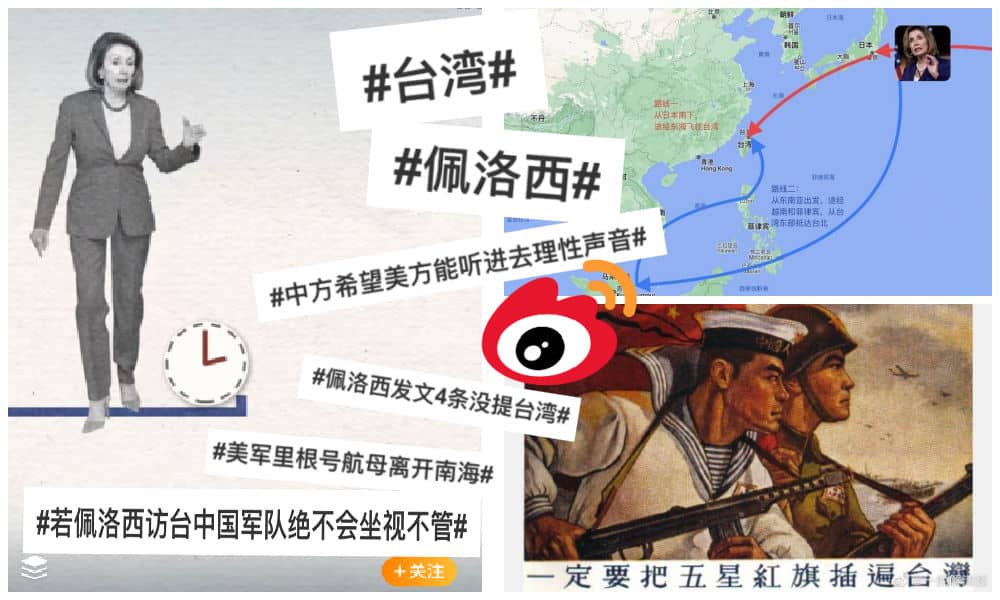
On Chinese social media there are different views on what a potential Taiwan visit by Nancy Pelosi might mean for China, the U.S., and Sino-American relations. But whether she might actually visit Taiwan or not, virtually nobody seems to be looking at the latest developments with rose-colored glasses.
She is called ‘the American Old Lady’ and ‘the Old Witch’ on Chinese social media. Nancy Pelosi, or Pèiluòxī (佩洛西), is all the talk on Weibo this week since reports came out that the U.S. House Speaker is planning a visit to Taiwan.
It is the second time this year a potential Pelosi Taiwan trip raises U.S.-China tensions. Earlier this year, there were also reports that Pelosi would lead a delegation to visit Taiwan on April 10. But just days before, on April 7, news came out that Pelosi had tested positive for Covid-19 and her Asia trip was postponed.
In July 2022, although not officially announced, reports again came out that Pelosi might visit Taiwan during her rescheduled Asia trip, during which she is planned to visit Singapore, Malaysia, South Korea, and Japan (no mention of Taiwan as of July 31st). If she would also land in Taiwan, she would be the first House speaker to visit Taiwan in 25 years.
There have been several hashtag pages on Weibo dedicated to the topic of Pelosi’s alleged Taiwan visit. One of the hashtags popping up on Chinese social media on July 25 was “Pelosi Visiting Taiwan” (#佩洛西访台#). By July 30, there was the CCTV-initiated hashtag “If Pelosi Visits Taiwan, China’s Military Will Not Sit Back and Watch” (#若佩洛西访台中国军队绝不会坐视不管#).
On the same day, there was the Global Times-initiated hashtag “Trump Slams Pelosi’s Possible Visit to Taiwan” (#特朗普抨击佩洛西可能访台#), and “If Pelosi’s Visit Happens, Mainland Will Take Decisive Taiwan Measures” (#佩洛西若窜访成行大陆将对台采取断然措施#), hosted by the official account of the Chinese People’s Political Consultative Conference (CPPCC). And then there was the “Geng Shuang Says Involved Countries Should Not Play With Fire” hashtag (#耿爽说有关国家不要玩火自焚#), referring to an address by China’s deputy permanent representative to the UN. On July 29, Geng Shuang highlighted the apparent hypocrisy of individual countries repeatedly stressing the principle of sovereignty when it comes to Ukraine, while challenging China’s sovereignty when it comes to the Taiwan issue – and in doing so, “deliberately creating tensions.”
On Sunday, the hashtags “Pelosi” and “Pelosi Sends Our Four Messages without Mentioning Taiwan” (#佩洛西发文4条没提台湾#) (referring to these tweets by Pelosi) both went trending, receiving 110 and 270 million views respectively within one day.
What would Pelosi’s potential visit to Taiwan mean to mainland China? Chinese state media outlets are clear about China’s official stance. China Daily (Global Edition) headlined “Xi: No Room for interference on Taiwan question” on its newspaper frontpage on Friday. The English-language Global Times published a statement via Twitter, saying: “We have ways to raise the risk of Pelosi’s “performance” through the visit, greatly increase the cost of her performance, and boost the price she has to pay. Let Pelosi deeply realize that Taiwan island is not a place where she can run wild.”
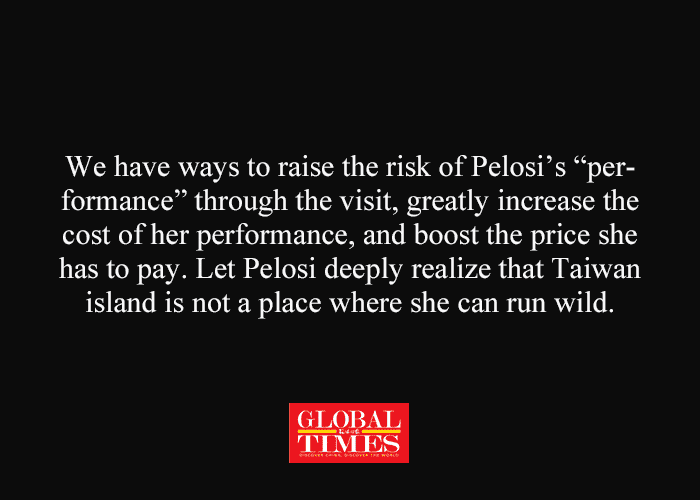
In light of a two-hour telephone conversation between President Xi Jinping and President Joe Biden on July 28, there were also some softer stances. The Chinese-language People’s Daily published an article suggesting that Sino-American relations should focus on strengthening communication to avoid misunderstandings and promote further cooperation between the two countries.
Meanwhile, there are many netizens and bigger bloggers discussing this issue on Chinese social media. Combing out all the posts on Pelosi flooding Weibo these days, there seem to be three main views shared by the majority, which we will further detail below.
VIEW 1: PELOSI’S VISIT MEANS THE U.S. SUPPORTS TAIWAN INDEPENDENCE (AND THAT MEANS WAR)
A common stance on Chinese social media regarding Pelosi’s visit is that it would mean a U.S. recognition of Taiwan as an independent state, which is a direct provocation of mainland China.
One popular blogger (@封起De日子) writes:
“If Pelosi really visits Taiwan, it actually means the U.S. approves of Taiwan independence. Taiwan has then become de facto independent. Pelosi would be the third U.S. government person to do so, which is extraordinary. Taiwan is Chinese territory, and if we ignore such an undertaking, we would deny that foundation ourselves. This is a serious provocation. We have so far lacked a strong voice and statement, and the central government and the Central Military Commission and other departments should declare that Pelosi’s visit to Taiwan means a war provocation! If Pelosi’s plane enters China’s airspace and territorial waters of Taiwan, the armed forces of the Chinese People’s Liberation Army have the right to decisively shoot down (kill) it at any time! This position would be the right one for any sovereign country.”
Another commenter writes: “If Pelosi visits Taiwan in the next two days she’ll cause a war. If the country needs donations, I, as an ordinary Chinese citizen, am willing to donate to my country, and I would even be willing to sacrifice my life.”
“If a U.S. Army Aircraft dares to enter Taiwan, it is an invasion, and we can shoot it down,” an influential gaming blogger (@老刀99, over 2 million fans) also wrote.
This kind of reasoning follows that of the influential Global Times commentator Hu Xijin (@胡锡进), who suggested that a Taiwan visit by Pelosi would be a clear provocation, giving the People’s Liberation Army (PLA) “good reason” for “waging a war.”
One of Hu’s tweets, in which he voiced the view that U.S. military planes escorting Pelosi to Taiwan could potentially be shot down, was deleted from Twitter. He reported about this on his Weibo account.
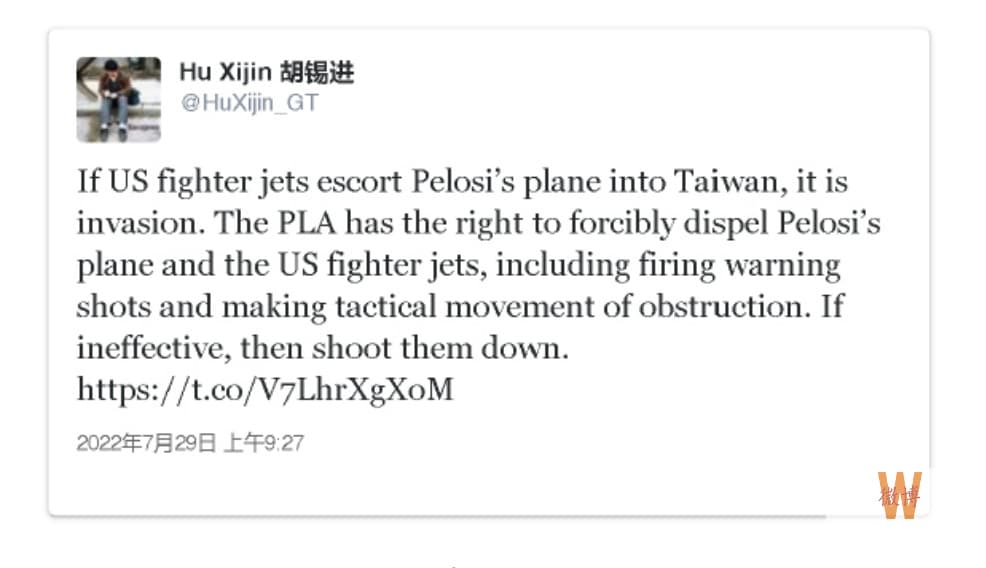
Hu Xijin tweet which was deleted by Twitter on July 30.
In another post on July 31, Hu warned Taiwan leadership that by agreeing to a Pelosi visit and “seeking ‘international support,'” they are “forgetting that their fate is in the hands of the mainland.”
Some commenters said they actually hoped Pelosi would go to Taiwan in order to let the real conflict begin: “I hope Pelosi’s visit to Taiwan will succeed,” one Weibo user wrote: “These years, I’ve heard too many forced righteous words, I don’t know where our bottom line is anymore, I just see the non-stop favors, while they’re snickering and looking down on us. It’s no use when it’s all talk and no action and it’s ineffective to keep on crying wolf. Pelosi, come on!”
“If the day Pelosi visits Taiwan is the day we recover Taiwan, should we still prevent her from visiting?” another Weibo user wonders.
On July 28, Fujian’s Pingtan Maritime Safety Administration issued a navigation warning that there would be live-fire exercises on July 30 in the waters near Fujian, opposite Taiwan. On Weibo, the live-fire drill also became a topic of interest (#福建平潭部分海域实弹射击训练#), with many applauding the exercises.
“We must resolutely defend national sovereignty and defend our territorial integrity,” one commenter wrote.
VIEW 2: IT’S ALL JUST FOR SHOW (AND TAIWAN IS A POLITICAL PLAYFIELD)
Another view expressed on Chinese social media is that a potential Taiwan visit would be just for show, and that neither Pelosi nor the U.S. truly have Taiwan’s best interests at heart.
According to some, a visit to Taiwan would be nothing more than a political “fashion show” for Pelosi, since this might be the last big Asia trip for the 82-year-old politician. “It’s just a superficial performance,” one military blogger wrote. There are more people agreeing with this stance. “This is to show off her courage and guts as a way to end her term of office,” author Zhang Huilin writes (over 2M followers @张慧林).
Others also suggest that China would not start a war over such a move. Keluo Liaofu (@科罗廖夫), an author on military affairs with over 6 million fans, writes:
“If Pelosi really visits Taiwan, the mainland will certainly be furious, and there will be fierce retaliation, including military-diplomatic and economic retaliation such as halting certain Sino-American cooperations, expulsion of diplomats, and other punitive sanctions. Then, as things go, this will be forgotten after a few months.”
Another blogger describes Taiwan as a political play field, literally a ‘chessboard’, that is used by the big ‘chess players’ – China and the United States – who are also surrounded by other supporting players. Taiwan is just a “gambit” and it is not about Taiwan itself, the blogger suggests: the Taiwan issue is just a strategy for the U.S. to “suppress China” and the moves made by both the U.S. and China regarding Taiwan are ways to test out each other’s “red lines.”
“It’s all just bluff. She won’t even dare to visit,” another person writes.
VIEW 3: U.S.-CHINA RELATIONS ARE ALREADY BAD REGARDLESS IF SHE VISITS OR NOT (AND THINGS WILL NOT CHANGE)
Another view on the potential Taiwan visit is that whether Pelosi actually visits or not, reports about the trip have already brought China-U.S. relations to a new low point.
“Regardless of whether Pelosi visits Taiwan in whatever way, the political basis for U.S.-China relations is already severely broken, [because] it means that the national will of the United States does not take [our] relationship seriously at all,” one Weibo blogger writes: “No need to harbour any illusions.”
Some netizens express that China always has to be the ‘reasonable voice’ that is ignored by an obstinate and provocative America.
Weibo vlogger Yuanzhezhi (@袁者之) writes:
“As just one web user, and as a Chinese, I would like to express my personal voice. The U.S. side should stop obstinately persisting in making things go the wrong way, to insist on creating global unrest. Can they only be happy when there are regional tensions? If Pelosi ignores the voice of the Chinese, the consequences and responsibilities will be borne by the U.S. side. I hope that the U.S. can listen to some of the domestic and international voices of reason, and that they can stop obsessively making the same mistakes over and over again, resulting in an irreversible situation, moving further and further away from the U.S.-China relationship!”
Another popular educational blogger (@才疏学浅柏拉图, over 1M fans) writes:
“My guess is that America is not prepared, and that we’re not prepared enough either. But our public opinion is already shaped and fixed in place. It makes me think of how Zhuge Liang used the empty city to scare Sima Yi (t/n: reference to ‘Empty Fort Strategy‘, reverse psychology to scare the enemy). Maybe the American Old Lady ends up going to a third-party location where she’ll invite Taiwan leadership, so she can express the American support [for Taiwan] without making us lose face, but the struggle between the U.S. and China remains the same.”
Just before Sunday midnight, news blogger Dayue Chuqing (@大越楚卿) asked his followers what the motive might be for Pelosi to visit Taiwan.
While some say she is doing for herself and others suggest it’s U.S. power politics, there are also those who consider an entirely different motive: “Maybe she just really feels like eating Taiwanese cuisine.”
To read more of our articles on Sino-US relations, click here.
By Manya Koetse
Get the story behind the hashtag. Subscribe to What’s on Weibo here to receive our weekly newsletter and get access to our latest articles:
Spotted a mistake or want to add something? Please let us know in comments below or email us. First-time commenters, please be patient – we will have to manually approve your comment before it appears.
©2022 Whatsonweibo. All rights reserved. Do not reproduce our content without permission – you can contact us at info@whatsonweibo.com.
Manya is the founder and editor-in-chief of What's on Weibo, offering independent analysis of social trends, online media, and digital culture in China for over a decade. Subscribe to gain access to content, including the Weibo Watch newsletter, which provides deeper insights into the China trends that matter. More about Manya at manyakoetse.com or follow on X.

China Media
Revisiting China’s Most Viral Resignation Letter: “The World Is So Big, I Want to Go and See It”
The woman behind the famous resignation note, ‘I want to see the world,’ ended up traveling in China before going back home.
Published
1 week agoon
March 19, 2025
We include this content in the Weibo Watch newsletter. Subscribe to get it in your inbox 📩
“The world is so big, I want to go out and see it” (Shìjiè nàme dà, wǒ xiǎng qù kànkan “世界那么大,我想去看看”).
This ten-character sentence became part of China’s collective social media memory after a teacher’s resignation note went viral in 2015. Now, a decade later, the phrase has gone viral once again.
In April 2015, the phrase caused a huge buzz on China’s social media when the female teacher Gu Shaoqiang (顾少强) at Zhengzhou’s Henan Experimental High School resigned from her job.
Working as a psychology teacher for 11 years, she gave a class in which she made students write a letter to their future self. The exercise made her realize that she, too, wanted more from life. Despite having little savings, she submitted a simple resignation note that read: “The world is so big, I want to go out and see it.”
The resignation letter was approved, and she posted it to social media.
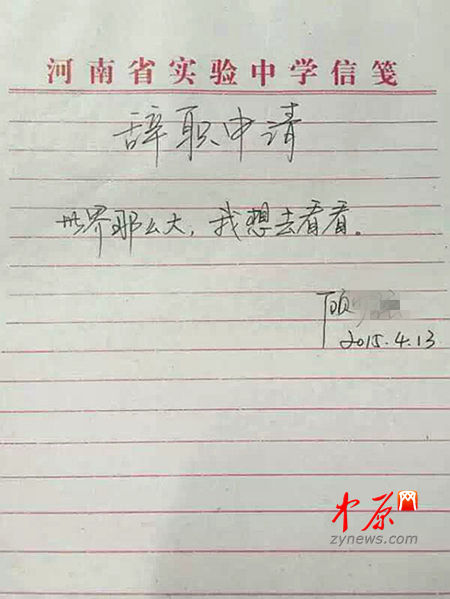
The resignation note that went viral, saying: “The world is so big, I want to go out and see it.”
The letter resonated with millions of Chinese who felt they also wanted to do something different with their life, like go and travel, see the world, and escape the pressures and routines of their daily life.
The phrase became so popular that it was adapted in all kinds of ways and manners, by meme creators, in books, by brands, and even by Xi Jinping, who said: “China’s market is so big, we welcome everyone to come and see it” (“中国市场这么大,欢迎大家都来看看”).
This week, Lěngshān Record (冷杉Record), the Wechat account under Chinese media outlet Phoenix Weekly (凤凰周刊), revisited the phrase and published a short documentary about Gu’s life after the resignation and the hype surrounding it.
An earlier news article about Gu’s life post-resignation already disclosed that Gu, despite receiving many sponsorship deals, never actually extensively traveled the world.
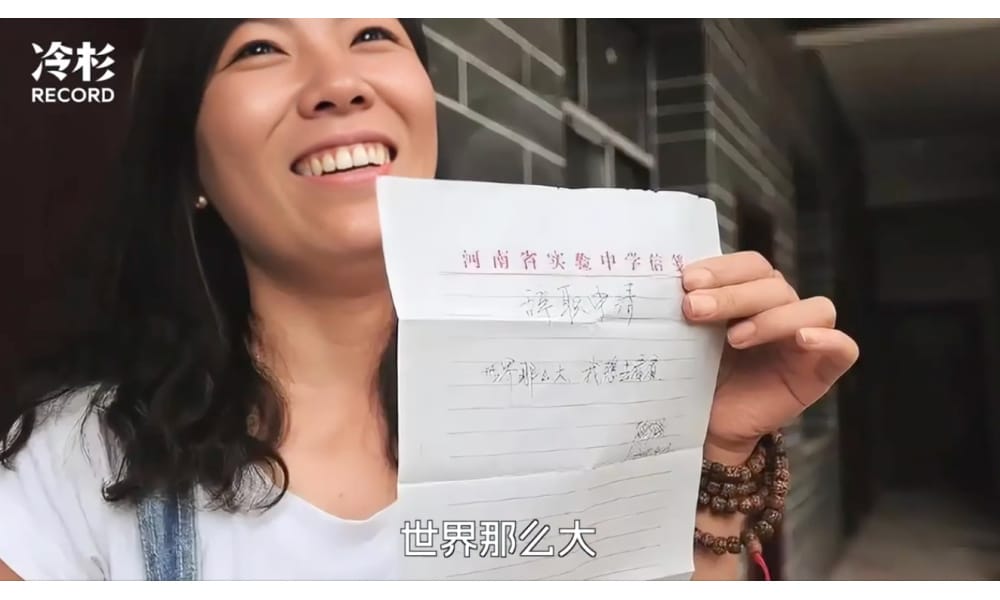
Gu and the viral resignation letter.
In the short documentary, Gu explains that she chose to “return home after seeing the world.” By this, she doesn’t mean traveling extensively abroad, but rather gaining life experience in a broader sense. While she did travel, it was within China, including in Tibet and Qinghai.
What truly changed was her life path. She left Zhengzhou and relocated to Chengdu to be near Yu Fu (于夫), a man she had met just weeks earlier by chance during a trip to Yunnan.
Six months after the resignation letter, she married him. Together, they ended up opening a hostel near Chengdu, married, and had a daughter.
Gu, now 45 years old, has been back in her hometown of Zhengzhou for the past years, caring for her aging mother and 9-year-old daughter. She is living separately from her husband, who manages their business in Chengdu. She also runs her own livestreaming and online parenting consultancy business.
Although the woman who wanted to “see the world” ended up back home, she has zero regrets about what she did, suggesting her courage to step out of the life she found limiting ultimately transformed her in a meaningful way.
On Chinese social media, the topic went trending on March 19. Most people cannot believe it’s already been ten years since the sentence went trending (“What? How could time fly like that?”).
Others, however, wonder about the hopes and dreams behind the original message—and how it all turned out.
“Seeing the world? She just escaped her old life, got married, and had a baby. How is that ‘seeing the world’?” one commenter wondered (@-NANA酱- ).
“The world is so big—what did she end up seeing?” others questioned. “She went from Zhengzhou to Chengdu.”
“Seeing the world takes money,” some pointed out.
But others came to her defense, saying that “seeing the world” also means stepping out of your comfort zone and exploring a different life. In the end, Gu certainly did just that.
“She was quite courageous,” another commenter wrote: “She gave up a stable job to go and see the world. Perhaps her life didn’t end up so rich, but the experiences she gained are priceless.”
The world is still big, though, and there’s plenty left for Gu Shaoqiang to see.
Read what we wrote about this in 2015: In The Digital Age, ‘Handwritten Weibo’ Have Become All The Rage
By Manya Koetse
(follow on X, LinkedIn, or Instagram)
Spotted a mistake or want to add something? Please let us know in comments below or email us. First-time commenters, please be patient – we will have to manually approve your comment before it appears.
©2025 Whatsonweibo. All rights reserved. Do not reproduce our content without permission – you can contact us at info@whatsonweibo.com.
China Media
12-Year-Old Girl from Shandong Gets Infected with HPV: Viral Case Exposes Failures in Protecting Minors
A doctor in Tai’an faced resistance when she tried to report a 12-year-old girl’s HPV case. She then turned to social media instead.
Published
3 months agoon
December 18, 2024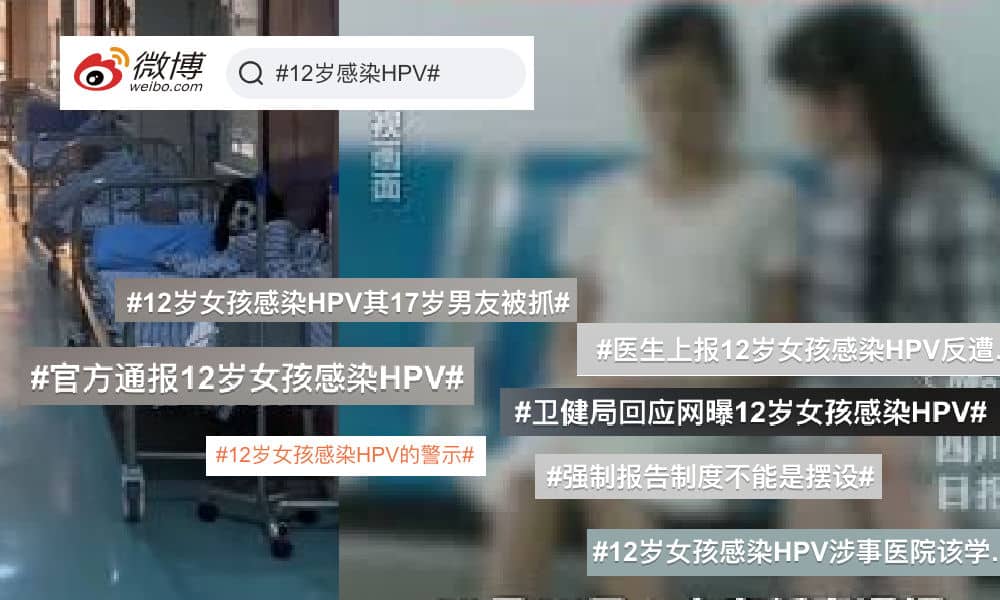
A 12-year-old girl from Shandong was diagnosed with HPV at a local hospital. When a doctor attempted to report the case, she faced resistance. Weibo users are now criticizing how the incident was handled.
Over the past week, there has been significant uproar on Chinese social media regarding how authorities, official channels, and state media in China have handled cases of sexual abuse and rape involving female victims and male perpetrators, often portraying the perpetrators in a way that appears to diminish their culpability.
One earlier case, which we covered here, involved a mentally ill female MA graduate from Shanxi who had been missing for over 13 years. She was eventually found living in the home of a man who had been sexually exploiting her, resulting in at least two children. The initial police report described the situation as the woman being “taken in” or “sheltered” by the man, a phrasing that outraged many netizens for seemingly portraying the man as benevolent, despite his actions potentially constituting rape.
Adding to the outrage, it was later revealed that local authorities and villagers had been aware of the situation for years but failed to intervene or help the woman escape her circumstances.
Currently, another case trending online involves a 12-year-old girl from Tai’an, Shandong, who was admitted to the hospital in Xintai on December 12 after testing positive for HPV.
HPV stands for Human Papillomavirus, a common sexually transmitted infection that can infect both men and women. Over 80% of women experience HPV infection at least once in their lifetime. While most HPV infections clear naturally within two years, some high-risk HPV types can cause serious illness including cancer.
“How can you be sure she was sexually assaulted?”
The 12-year-old girl in question had initially sought treatment for pelvic inflammatory disease, but upon review, her doctor discovered that she had been previously treated for vaginitis six months earlier. During further discussions with the girl, the doctor learned she had been sexually active with a boy five years her senior and was no longer attending school.
Given that the age of consent in China is 14 years old, the doctor sought to report the case to authorities. However, this effort was reportedly met with resistance from the hospital’s medical department, where she was allegedly questioned: “How can you be sure she was sexually assaulted?”
When attempts to escalate the case to the women’s federation and health commission went unanswered, the doctor turned to a blogger she knew (@反射弧超长星人影九) for help in raising awareness.
The blogger shared the story on Weibo but failed to receive a response through private messages from the Tai’an Police. They then contacted a police-affiliated Weibo channel they were familiar with, which eventually succeeded in alerting the Shandong police, prompting the formation of an investigation team.
As a result, on December 16, the 17-year-old boy was arrested and is now facing legal criminal measures.
According to Morning News (@新闻晨报), the boy in question is the 17-year-old Li (李某某), who had been in contact with the girl through the internet since May of 2024 after which they reportedly “developed a romantic relationship” and had “sexual relations.”
Meanwhile, fearing for her job, the doctor reportedly convinced the blogger to delete or privatize the posts. The blogger was also contacted by the hospital, which had somehow obtained the blogger’s phone number, asking for the post to be taken down. Despite this, the case had already gone viral.
The blogger, meanwhile, expressed frustration after the case gained widespread media traction, accusing others of sharing it simply to generate traffic. They argued that once the police had intervened, their goal had been achieved.
But the case goes beyond this specific story alone, and sparked broader criticisms on Chinese social media. Netizens have pointed out systemic failures that did not protect the girl, including the child’s parents, her school, and the hospital’s medical department, all of whom appeared to have ignored or silenced the issue. As WeChat blogging account Xinwenge wrote: “They all tacitly colluded.”
Xinwenge also referenced another case from 2020 involving a minor in Dongguang, Liaoning, who was raped and subsequently underwent an abortion. After the girl’s mother reported the incident to the police, the procuratorate discovered that a hospital outpatient department had performed the abortion but failed to report it as required by law. The procuratorate notified the health bureau, which fined the hospital 20,000 yuan ($2745) and revoked the department’s license.
Didn’t the hospital in Tai’an also violate mandatory reporting requirements? Additionally, why did the school allow a 12-year-old girl to drop out of the compulsory education programme?
“This is not a “boyfriend” or a “romantic relationship.””
The media reporting surrounding this case also triggered anger, as it failed to accurately phrase the incident as involving a raped minor, instead describing it as a girl having ‘sexual relations’ with a much older ‘boyfriend.’
Under Chinese law, engaging in sexual activity with someone under 14, regardless of their perceived willingness, is considered statutory rape. A 12-year-old is legally unable to give consent to sexual activity.
“The [Weibo] hashtag should not be “12-Year-Old Infected with HPV, 17-Year-Old Boyfriend Arrested” (#12岁女孩感染HPV其17岁男友被抓#); it should instead be “17-Year-Old Boy Sexually Assaulted 12-Year-Old, Causing Her to Become Infected” (#17岁男孩性侵12岁女孩致其感染#).”
Another blogger wrote: “First, we had the MA graduate from Shanxi who was forced into marriage and having kids, and it was called “being sheltered.” Now, we have a little girl from Shandong being raped and contracting HPV, and it was called “having a boyfriend.” A twelve-year-old is just a child, a sixth-grader in elementary school, who had been sexually active for over six months. This is not a “boyfriend” or a “romantic relationship.” The proper way to say it is that a 17-year-old male lured and raped a 12-year-old girl, infecting her with HPV.”
By now, the case has garnered widespread attention. The hashtag “12-Year-Old Infected with HPV, 17-Year-Old Boyfriend Arrested” (#12岁女孩感染HPV其17岁男友被抓#) has been viewed over 160 million times on Weibo, while the hashtag “Official Notification on 12-Year-Old Infected with HPV” (#官方通报12岁女孩感染hpv#) has received over 90 million clicks.
Besides the outrage over the individuals and institutions that tried to suppress the story, this incident has also sparked a broader discussion about the lack of adequate and timely sexual education for minors in Chinese schools. Liu Wenli (刘文利), an expert in children’s sexual education, argued on Weibo that both parents and schools play critical roles in teaching children about sex, their bodies, personal boundaries, and the risks of engaging with strangers online.
“Protecting children goes beyond shielding them from HPV infection,” Liu writes. “It means safeguarding them from all forms of harm. Sexual education is an essential part of this process, ensuring every child’s healthy and safe development.”
Many netizens discussing this case have expressed hope that the female doctor who brought the issue to light will not face repercussions or lose her job. They have praised her for exposing the incident and pursuing justice for the girl, alongside the efforts of those on Weibo who helped amplify the story.
The blogger who played a key role in exposing the story recently wrote: “I sure hope the authorities will give an award to the female doctor for reported this case in accordance with the law.” For some, the doctor is nothing short of a hero: “This doctor truly is my role model.”
By Manya Koetse, with contributions by Miranda Barnes
(follow on X, LinkedIn, or Instagram)
Spotted a mistake or want to add something? Please let us know in comments below or email us. First-time commenters, please be patient – we will have to manually approve your comment before it appears.
©2024 Whatsonweibo. All rights reserved. Do not reproduce our content without permission – you can contact us at info@whatsonweibo.com.
Subscribe

How K-pop Fans and the 13-Year-Old Daughter of Baidu VP Sparked a Debate on Online Privacy

Squat or Sit? China’s Great Toilet Debate and the Problem of Footprints on the Seat

Weibo Watch: The Great Squat vs Sitting Toilet Debate in China🧻

Chinese Netizens Turn to Tim Cook Over Battery Factory’s Illegal Overtime

Revisiting China’s Most Viral Resignation Letter: “The World Is So Big, I Want to Go and See It”

Our Picks: Top 10 Chinese Buzzwords and Phrases of 2024 Explained

“Dear Li Hua”: The TikTok/Xiaohongshu Honeymoon Explained

Beyond the Box Office: What’s Behind Ne Zha 2’s Success?

Weibo Watch: Christmas in China Is Everywhere and Nowhere

Weibo Watch: A New Chapter

12-Year-Old Girl from Shandong Gets Infected with HPV: Viral Case Exposes Failures in Protecting Minors

15 Years of Weibo: The Evolution of China’s Social Media Giant

Tuning Into the Year of the Snake

The ‘China-chic Girl’ Image and the Realities of China’s Competitive Food Delivery Market

TikTok Refugees, Xiaohongshu, and the Letters from Li Hua
Get in touch
Would you like to become a contributor, or do you have any tips or suggestions? Get in touch here!
Popular Reads
-

 China Insight11 months ago
China Insight11 months agoThe Tragic Story of “Fat Cat”: How a Chinese Gamer’s Suicide Went Viral
-

 China Music12 months ago
China Music12 months agoThe Chinese Viral TikTok Song Explained (No, It’s Not About Samsung)
-

 China Digital10 months ago
China Digital10 months agoChina’s 2024 Gaokao Triggers Online Discussions on AI
-

 China Arts & Entertainment10 months ago
China Arts & Entertainment10 months agoSinging Competition or Patriotic Fight? Hunan TV’s ‘Singer 2024’ Stirs Nationalistic Sentiments





Matthew Campbell
August 1, 2022 at 4:38 pm
It’s so said that the majority of netizens see this as a furthering of tensions rather than a chance at dialog. The US is always going to defer to Taiwan on it’s path for the future and the only way the Taiwan crises gets solved peacefully is communication. That means China shouldn’t be afraid of the de facto status that Taiwan is independent. They should be trying to woo Taiwan, not threaten them.